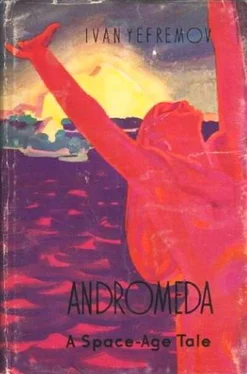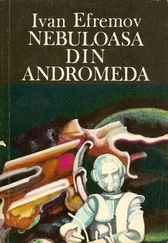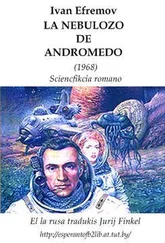Ivan Yefremov - Andromeda (A Space-Age Tale)
Здесь есть возможность читать онлайн «Ivan Yefremov - Andromeda (A Space-Age Tale)» весь текст электронной книги совершенно бесплатно (целиком полную версию без сокращений). В некоторых случаях можно слушать аудио, скачать через торрент в формате fb2 и присутствует краткое содержание. Город: Moscow, Год выпуска: 1959, Издательство: FOREIGN LANGUAGES PUBLISHING HOUSE, Жанр: Фантастика и фэнтези, на английском языке. Описание произведения, (предисловие) а так же отзывы посетителей доступны на портале библиотеки ЛибКат.
- Название:Andromeda (A Space-Age Tale)
- Автор:
- Издательство:FOREIGN LANGUAGES PUBLISHING HOUSE
- Жанр:
- Год:1959
- Город:Moscow
- ISBN:нет данных
- Рейтинг книги:5 / 5. Голосов: 1
-
Избранное:Добавить в избранное
- Отзывы:
-
Ваша оценка:
- 100
- 1
- 2
- 3
- 4
- 5
Andromeda (A Space-Age Tale): краткое содержание, описание и аннотация
Предлагаем к чтению аннотацию, описание, краткое содержание или предисловие (зависит от того, что написал сам автор книги «Andromeda (A Space-Age Tale)»). Если вы не нашли необходимую информацию о книге — напишите в комментариях, мы постараемся отыскать её.
Andromeda (A Space-Age Tale) — читать онлайн бесплатно полную книгу (весь текст) целиком
Ниже представлен текст книги, разбитый по страницам. Система сохранения места последней прочитанной страницы, позволяет с удобством читать онлайн бесплатно книгу «Andromeda (A Space-Age Tale)», без необходимости каждый раз заново искать на чём Вы остановились. Поставьте закладку, и сможете в любой момент перейти на страницу, на которой закончили чтение.
Интервал:
Закладка:
“I shall have to live here until the end of my holiday,” laughed Evda, “and what will Veda Kong do?”
The girl suddenly remembered her mother’s companion.
“She’s very nice,” said Rhea, seriously, “and almost as beautiful as you are!”
“She’s much more beautiful!”
“No, I know… and it’s not because you’re my mother,” said the girl, bashfully. “Perhaps she’s better at first glance but you have a spiritual tabernacle within you that Veda Kong hasn’t yet got. I don’t say she won’t have, it’s just that she hasn’t built it yet… but she’ll build it and then….”
“Then she’ll outshine your mother like a moon outshines the stars.”
Rhea shook her head.
“And are you going to stand still? You’ll go farther than she!”
Evda passed her hand over the girl’s smooth hair and looked down into her upturned face.
“Isn’t that enough eulogy, daughter? We’re wasting time!”
Veda Kong walked slowly down an avenue that led her deeper into a grove of broad-leaved maples, whose heavy moist foliage rustled dully. The first wraiths of the evening mist were making an effort to rise from a nearby meadow but they were instantly dispersed by the wind. Veda Kong was pondering over the mobile tranquillity of nature and thinking that the sites for the schools were always so well chosen. The development of a keen perception of nature and a sensitive communion with nature were an important part of the child’s training. Dulled interest in nature is, in actual fact, an impediment to man’s development, for one who has forgotten how to observe will soon lose the ability to generalize. Veda thought about the ability to teach, the most important of all competencies in the age when they had at last learned that upbringing was more important than education and was the only way to prepare the child for the difficult job of being a real man. The basis, of course, is provided by inherent abilities but they might easily be left undeveloped, without that chiselling of the human spirit that is done by the pedagogue.
Veda’s mind turned back to those distant days when she had been a third cycle schoolgirl, a mass of contradictions, burning with the desire to sacrifice herself and at the same time judging the world by herself alone, with all the egocentrism of healthy youth. How much the teachers did for her in those days — in truth there is no loftier profession in this world of ours than that of teacher!
The future of mankind is in the hands of the teacher for it is only by his efforts that man rises ever higher and becomes more and more powerful, coping with the most arduous of all tasks, that of overcoming himself, his greedy self-love and his unbridled desires.
Veda Kong turned towards a small bay surrounded by pines where she could hear the sounds of youthful voices; soon she came upon a dozen boys in plastic aprons busily trimming an oak beam with axes, instruments that had been invented as far back as the stone age. The young builders greeted the historian respectfully and explained to her that they wanted to build a vessel without the aid of automatic saws and other machinery, in the same way as the heroes of ancient days had done. The ship, when built, was to take them to the ruins of Carthage, a trip they wanted to make during their vacation, accompanied by the teachers of geography, history and polytechnics.
Veda wished them success and intended to continue on her way. A tall, thin lad with absolutely yellow hair stepped forward.
“You came here with Evda Nahl, didn’t you? Then may I ask you a couple of questions?”
Veda laughingly consented.
“Evda Nahl works at the Academy of Sorrow and Joy. We have studied the social organization of our planet and of several other worlds, but we have not been told the significance of that Academy.”
Veda told them of the great census conducted by the Academy to compute sorrow and happiness in the lives of individuals and investigate sorrow by age groups. It was followed by an analysis of sorrow and joy for all the stages of the historical development of mankind. No matter what qualitative differences there may have been in emotions, the sum totals, investigated by big number stochastic [23] Stochastics — a branch of mathematics studying the laws of large numbers.
methods, showed some important regularities. The Councils that directed the further development of society did their utmost to correct any worsening and ensure improvement. Only when joy predominated, or at least counterbalanced sorrow, was it considered that society was developing successfully.
“And so the Academy of Sorrow and Joy is the most important?” asked another boy, one with bold eyes. The others smiled and the boy who had first spoken to Veda Kong explained what they were laughing at.
“Oil is always looking for what is most important. He dreams about the great leaders of the past….”
“That’s a dangerous thing to do,” smiled Veda. “As an historian I can tell you that the great leaders were people who were themselves tied hand and foot and very dependent.”
“Tied up by the conventionalism of their actions?” asked the yellow-haired boy.
“Exactly. But you must remember that that was in the unevenly and spontaneously developing ancient societies of the Era of Disunity or even earlier. Today, leadership invested in each of the Councils and is expressed by the fact that the action of all the others is impossible without it.”
“What about the Economic Council? Without that Council nobody can undertake anything big,” Oil objected cautiously, somewhat abashed but still not confused.
“That’s true because economics are the only real basis of our existence. But it seems to me that you don’t have quite the right idea of what constitutes leadership. Have you studied the cytoarchitectonics [24] Cytoarchitectonics — a detailed study of the structure of the brain according to the distribution and specialization of the nerve cells.
of the human brain?”
The boys said that they had.
Veda took a stick from one of them and in the sand drew circles to represent the administrative bodies.
“Here in the centre is the Economic Council. We will draw direct links from it to the consultative bodies: the ASJ, the Academy of Sorrow and Joy, the APF, the Academy of Productive Forces, the ASP the Academy of Stochastics and Prognostication, the APL, the Academy of the Psychophysiology of Labour. There is lateral connection with the Astronautical Council, a body that functions independently. From the latter there is direct communication with the ADR, the Academy of Directed Radiation, and the Outer Stations of the Great Circle. Further….”
Veda drew an intricate diagram in the sand and continued.
“Isn’t that just like the human brain? The research and registration centres are the sensory nerve centres. The Councils are the associative centres. You know that all life consists of the dialectics of attraction and repulsion, the rhythm of dispersal and accumulation, excitation and inhibition. The chief inhibition centre is the Economic Council that translates everything into the actual possibilities of the social organism and its objective laws. Our brain and our society, both of which are persistently advancing, have this dialectic interplay of opposing forces brought into harmonic action. There was a time, long ago, when this was incorrectly termed cybernetics, or the science of control, in an attempt to reduce the most intricate interplay of inhibitions to the relatively simple functioning of a machine. That attempt, however, was due to ignorance; the greater the knowledge we acquired the more complicated we found the phenomena and laws of thermodynamics, biology, and economics, and simplified conceptions of nature or the processes of social development disappeared for ever.”
Читать дальшеИнтервал:
Закладка:
Похожие книги на «Andromeda (A Space-Age Tale)»
Представляем Вашему вниманию похожие книги на «Andromeda (A Space-Age Tale)» списком для выбора. Мы отобрали схожую по названию и смыслу литературу в надежде предоставить читателям больше вариантов отыскать новые, интересные, ещё непрочитанные произведения.
Обсуждение, отзывы о книге «Andromeda (A Space-Age Tale)» и просто собственные мнения читателей. Оставьте ваши комментарии, напишите, что Вы думаете о произведении, его смысле или главных героях. Укажите что конкретно понравилось, а что нет, и почему Вы так считаете.











